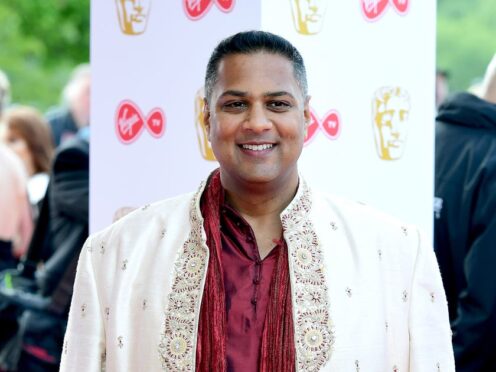Former Bafta chairman Krishnendu Majumdar said it is “crucial” that there is diversity among the “gatekeepers” who run the film and TV industry to “drive change” and level the playing field for all.
The award-winning film producer said there has been “some improvement” in front of the camera for women and people of colour “but not the disabled community”, and now the industry has to “really step up” so under-represented voices are heard in the boardroom.
“I don’t think there’s been a broadcaster with someone who has run it who is a person of colour, that’s got to change, but the boardrooms as well need to change,” he told the PA news agency.
“When I was chair of Bafta, we had a very diverse board, not just gender, ethnicity, but also disability as well, we had a couple of people who used wheelchairs, and it was just really good to have a different perspective around the table.
“I think that is what is crucial and that is what will drive change.”

He continued: “Obviously seeing is believing, so you’ve got to have people on screen as role models, so people can see something on the screen and say ‘Yeah, I can do that’.”
Mr Majumdar, who stepped down as the chair of Bafta this year after three years at the helm, predicts the “next big change” in the UK will be among the gatekeepers of the film and TV industry.
He said: “When I was growing up, there wasn’t anyone on telly or film who looked like me, and certainly no one in the industry as in behind the camera.
“It’s really difficult if you’re the only person from an underrepresented group – be it a woman, be it a person of colour, or being someone disabled – who’s in a group, who’s in a meeting, who’s in a room, who’s on a production, because it can be tough and lonely and you can be ostracised.
“Behind the camera we’ve got a huge amount of work to do, and particularly the leaders in the industry, the gatekeepers, you need to have some diversity of thought.
“I’m not just saying diversity of people, if you have people with different experiences, different backgrounds, that went to different universities, or maybe not even go to university, but you have a different way of looking at the world and a different perspective.
“I think that is crucial in terms of the gatekeepers, the people who control the finance and who run the industry.”

Bafta announced a raft of changes to its film awards – including expanding the nominations for director, actor and actress from five to six – in response to a lack of diversity at the 2020 film awards ceremony as nominations featured no non-white actors in the four main acting categories, and an absence of female directors.
Mr Majumdar guided the “careful and detailed” review of Bafta’s voting system which led to 120 changes to address the lack of diversity.
He told PA: “I have to say, it’s one of the best things I’ve ever been involved with, and it felt like we were really making a difference.
“Also, I think it sent a message out to the industry and obviously Bafta is in the spotlight, and it can really help shape the industry … it was a real levelling of the playing field.
“It was a really deep piece of work and I think it was a really big step forward for Bafta in terms of it becoming proactive rather than being passive at dealing with these kinds of issues.”
He said he was “really proud” of everything Bafta has achieved during his three-year tenure as chairman and hopes a new generation will pick up where he left off, led by new chair Sara Putt.

In his other projects, following on from the Bafta success with I Am Ruth starring Kate Winslet, Mr Majumdar has worked with British director Dominic Savage for the eighth time on the project Close To You with Oscar-nominated actor Elliot Page in his first film since coming out as transgender in 2020.
Mr Majumdar spoke about how Savage will meet and “connect” with actors before writing a screenplay without dialogue around a subject matter that they both want to explore.
“It’s a 50 or 60-page script, scene by scene, there’s a page written of what happens and how the characters are feeling and what action there is, but the dialogue is improvised,” he said.
“So when they come to set, there’s not really rehearsals, they talk to Dominic in the morning and then we film and some of the takes are half-an-hour long.
“Elliot developed and created the story with Dominic. The story isn’t autobiographical, but obviously it has significance and meaning, this is a story Elliot and Dominic wanted to tell and it happens to be about a trans man, but it’s not about that.
“It’s a love story, it’s a story about family, it’s about identity, it’s about hope, love, resilience.”
He said Winslet had a 59-minute take while filming I Am Ruth for Channel 4, which chronicles the relationship between a mother and child who is dealing with mental health pressures coming from the online world, starring opposite her real-life daughter Mia Threapleton.
Mr Majumdar’s upcoming projects also include Alice & Jack starring Andrea Riseborough and Domhnall Gleeson.
